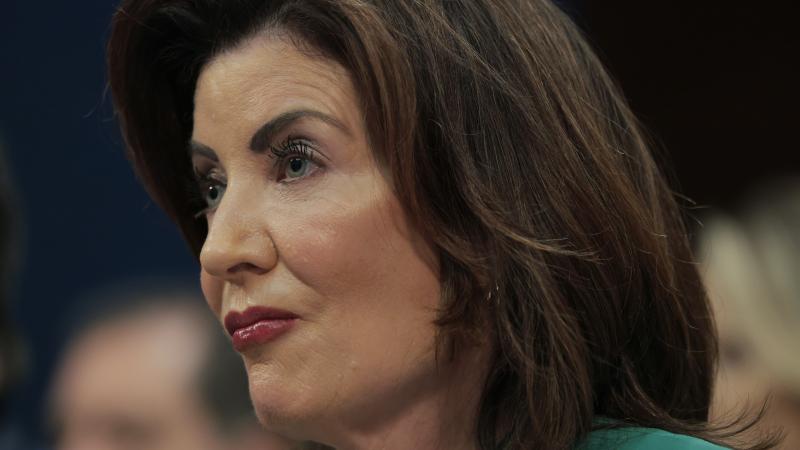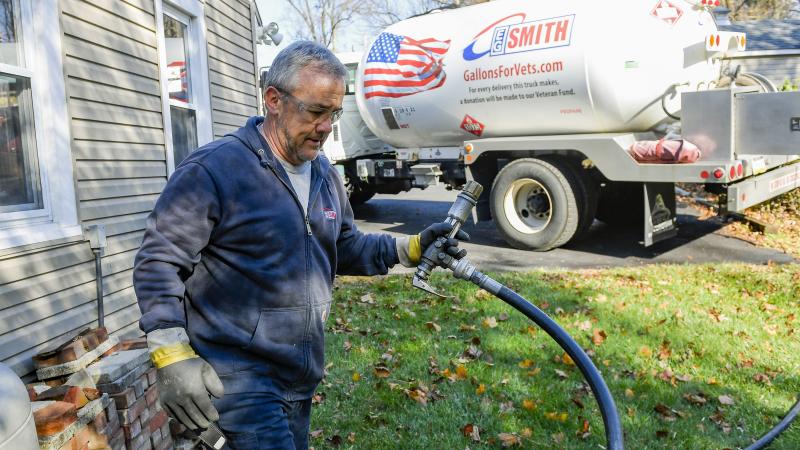Influential media groups are encouraging climate reporters to ignore dissenting voices, experts say
Experts with backgrounds in oil and gas say media groups are demonizing the industry as inherently deceptive and encouraging reporters to exclude the industry's perspectives from any reporting on climate and energy.
The Society for Environmental Journalists (SEJ) partnered up with the Maynard Institute for Journalism Education for a webinar Tuesday to provide data and information to journalists on the connection between gun violence and “extreme heat” in 100 of the largest cities in the U.S.
The tenuous nature of the research into a connection between global warming and gun violence should raise more scrutiny from reporters, but coverage of research exploring the link is largely friendly, and lacks the kind of skepticism one might expect from professional journalists.
The SEJ and Covering Climate Now (CCN) are part of a network of thousands of journalists and hundreds of media outlets reaching, according to CCN, an audience of 2 billion. Both groups receive funding from anti-fossil fuel activist organizations, and they encourage reporters to insert climate change into every topic, such as connecting gun violence to climate change, and avoid interviewing sources who question any aspect of the “climate crisis” narrative.
Experts with knowledge and backgrounds in oil and gas say these groups also demonize their industry and discourage reporters from including their perspectives in reporting on climate and energy. This means most energy and climate reporting is informed primarily by activists who want to see the industry eliminated.
“Virtually every journalism student is indoctrinated in college to have a moral responsibility to be a watchdog and a ‘voice for the voiceless.’ This is a huge culture shift from prior generations where journalists were trained to report objectively, include both sides, write the story and let the readers decide for themselves,” Tim Stewart, president of the U.S. Oil and Gas Association, told Just the News.
Climate change = urban shootings?
According to the research presented at the webinar, “climate change contributed to 370 additional shootings in Chicago, 285 extra shootings in New York, 146 in Detroit, 98 in Milwaukee, 83 in Minneapolis and 64 in Philadelphia.”
There have been a number of media reports over the past few years claiming a connection. As is the case with many stories blaming climate change for societal problems — everything from obesity to domestic violence — journalists are parroting research claiming to find a link. This is true of articles on the alleged connection between gun violence and climate change.
Researchers studying the link between climate change and gun violence acknowledge that there are more factors affecting gun violence than global warming. However, journalists covering the topic rarely ask researchers scrutinizing questions that would dispute if the connection exists at all.
There are many reasons to doubt the connection. For example, the homicide rate in the U.S. was far higher in the 1990s, when carbon dioxide levels in the atmosphere were considerably lower than they are today. The data presented at the SEJ webinar showed that heat-attributable shootings — in other words, shootings that were allegedly caused by climate change — were nearly 16% in Minneapolis, but only 5% in Albuquerque, where high temperatures in the summer are almost 10 degrees warmer than the Minnesota city. Likewise, Phoenix, one of the hottest cities in the U.S., showed a negative correlation between heat and gun violence, meaning that the higher temperatures lowered heat-attributable gun violence.
The SEJ boasts of having 1,400 members, many of which are reporters on the climate and energy beats. Among their initiatives is training journalists to avoid “disinformation.” An article concerning “disinformation” on the SEJ website claims that there is much more misleading information today. As an example of this alleged misinformation, it points to Rachel Carson's 1962 book “Silent Spring,” which was highly influential in the modern environmental movement and drove bans on the pesticide DDT.
The SEJ claims that the author, Rachel Carson, was attacked by the chemical industry with misinformation that “failed to discredit” her claims that pesticides were causing widespread harm to the environment. However, studies have found that the bans on DDT increased malaria deaths among the poor.
The article also rehashes the claims that oil companies knew about climate change for decades and funded campaigns to deny it. As German physicist Sabine Hossenfelder explains on X, there was a low level of confidence in the climate models among all climate researchers within the industry and outside of it at the period in which oil companies were allegedly denying their researchers' findings. She states she’s “not a fan of the fossil fuel industry,” but to claim oil companies “knew” about climate change is “nonsense.”
The SEJ article compares perspectives from the oil industry, which produces a product that makes modern civilization possible, to tobacco, a drug that causes serious health consequences. In an article claiming to debunk climate-change myths, Covering Climate Now tells reporters that it’s a myth that we can’t rapidly eliminate fossil fuels. All we have to do, according to CCN, is choose to do so. Many energy experts would disagree.
Pick up the phone
While people working in the oil industry have a financial interest in defending that industry, and there’s nothing wrong with reporters noting these sources’ association with the industry they’re defending, CCN and SEJ encourage reporters to view sources in the fossil fuel industries as inherently deceptive.
The SEJ hosted a training webinar in 2023 featuring Rebecca Lebar, who was a senior reporter for left-wing website Vox at the time, and Sammy Roth, climate columnist of the Los Angeles Times.
During the webinar, Leber stated that “There's also lots of misinformation going around, a lot propped up by gas utilities that have a stake in whether the economy is making this energy transition.” While responding to a question about the responsibility journalists have to be objective and give dissenting perspectives an opportunity to weigh in on stories, Roth said, “I definitely don't include climate denial voices in my stories.” He called them “red herrings.”
Covering Climate Now honored Roth with an award in its 2024 journalism awards.
Aaron Johnson, vice president of public and legislative affairs for the Western Energy Alliance (WEA), told Just the News that these groups weaponize claims of “disinformation” to encourage reporters to exclude any sources that would challenge their preferred narrative. He said the alliance is open to talking to reporters, and they don’t object when those reporters push back against their claims.
“But we wish reporters would listen to experts. And not avoid both sides in their journalism, which SEJ openly does,” Johnson said.
He said while there’s a lot of talk right now about toning down the rhetoric in politics, and in the energy and climate spaces, there’s also a lot of overheated rhetoric.
“We see that there’s a problem in certain media where organizations push extreme views. And we want to have those rational conversations. We welcome pushback, and we welcome tough questions. We expect it, but at least pick up the phone and have a conversation with us,” Johnson said.
Not welcoming to industry voices
He said the SEJ wasn’t always as hostile toward the industry as it is today. The organization used to invite WEA President Kathleen Sgamma to speak at their annual conference. Johnson said he tried to register to attend this year’s annual conference, but the registration page specifically stated that industry voices weren’t allowed.
“In the last 15 years, what we’re witnessing is the group is getting to be much more isolated, and they’re not welcoming differing views within their conferences,” Johnson said.
They had a whole day at the conference dedicated to disinformation, and Johnson said he would have liked the opportunity to have a voice in that conversation. He said there are good energy and climate reporters in the media who do give industry a fair shake, but that’s becoming more rare.
Stewart, of the U.S. Oil and Gas Association, pointed out how much funding for the SEJ and CCN come from anti-fossil fuel groups. Combined with the fact that many of these reporters, Stewart said, don’t distinguish between journalism and activism, the industry finds itself consistently demonized in the media and excluded as sources.
Reporters “are not going to be inclined to give the oil and gas industry equal time or even a voice in their reporting, because editors won’t publish you, and secondly, with that many people on the same beat, producing real content is difficult. That is why you now see so many garbage stories on energy and climate, with titles like ‘Climate change hits Indonesian transgender individuals the hardest.'” This was an actual article.
Just the News reached out to both the SEJ and CCN for comment on this article, with a lengthy explanation of what the article was about and if they felt the article is fairly characterizing the materials they present to reporters who use the trainings. Neither organization responded to the requests.
The Facts Inside Our Reporter's Notebook
Links
- Society for Environmental Journalists
- webinar
- research is largely friendly
- Covering Climate Now
- receive funding
- anti-fossil fuel activist organizations
- media reports
- past few years
- obesity
- domestic violence
- connection between gun violence and climate change
- far higher in the 1990s
- considerably lower
- data presented
- almost 10 degrees warmer
- on the SEJ website
- Silent Spring
- drove bans on the pesticide DDT
- studies have found
- Sabine Hossenfelder explains on X
- product that makes modern civilization possible
- claiming to debunk climate-change myths
- Experts would disagree
- hosted a training webinar in 2023
- weaponize claims of âdisinformationâ
- actual article















